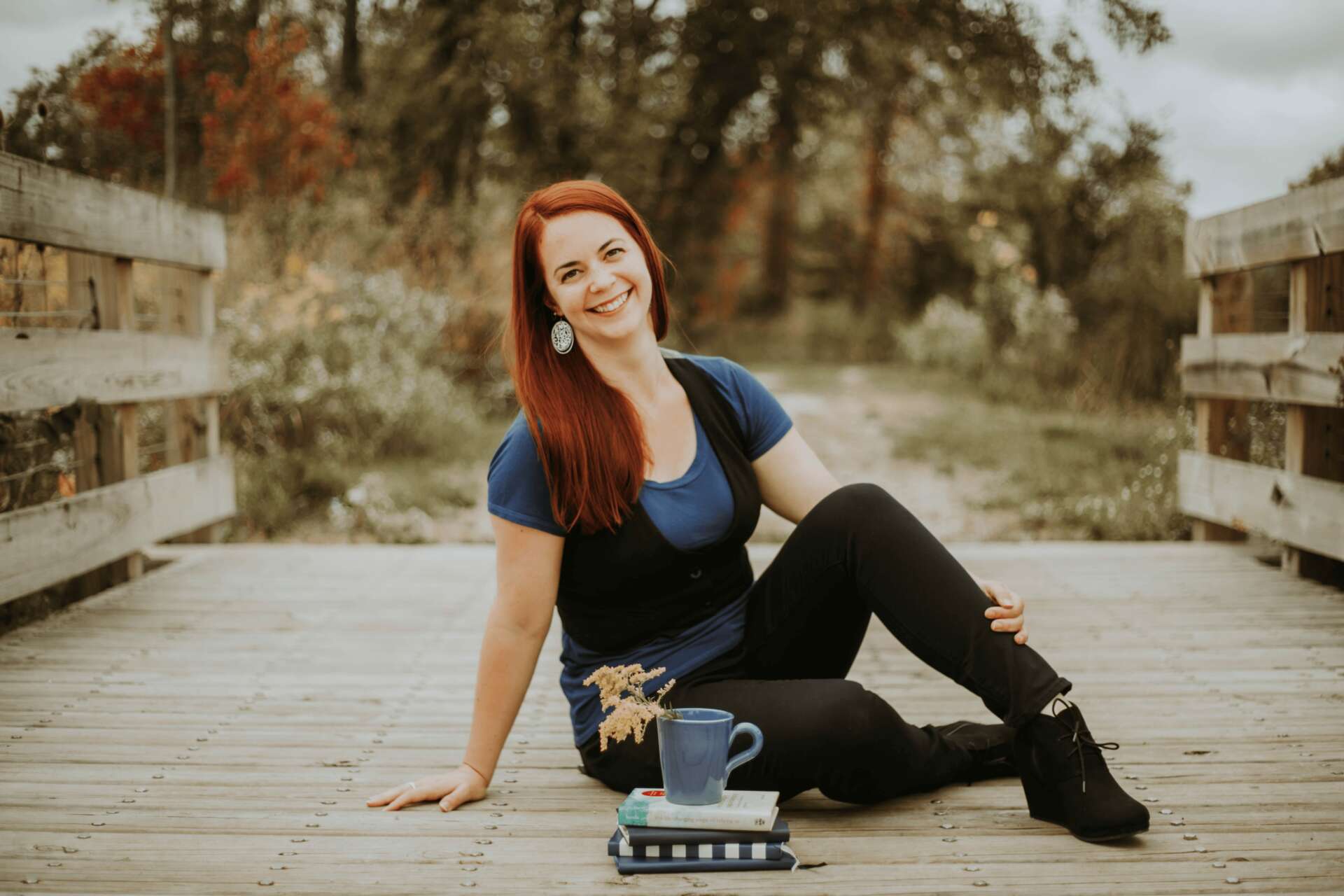We caught up with the brilliant and insightful Stephanie Linn a few weeks ago and have shared our conversation below.
Stephanie, looking forward to hearing all of your stories today. One of the most important things small businesses can do, in our view, is to serve underserved communities that are ignored by giant corporations who often are just creating mass-market, one-size-fits-all solutions. Talk to us about how you serve an underserved community.
I’m passionate about helping Highly Sensitive People see their sensitivity as the gift that is it – rather than a curse!
Highly Sensitive People (HSPs) make up 20% of the population. It’s a genetic trait that makes us more psychologically and neurologically sensitive than the average person. That means we pick up on other people’s emotions easily, get caught up in our thoughts and processing, and take in way more physical stimulation than average.
High Sensitivity is a type of neurodivergence (neurospicy), but it isn’t something that needs to be diagnosed, medicated, or pathologized. It’s simply the way we process and interact with the world.
When HSPs are out of balance, they pick up other people’s emotions and carry them around for hours, days, weeks, and sometimes even years before they can release them. They get caught in analysis paralysis and have trouble making decisions, despite being able to process more information than most. And they tend to hide out from the world in order to keep themselves from getting overstimulated and overwhelmed with a noisy, fast-paced world that wasn’t built for them.
When HSPs are in balance with their trait, they are some of the most empathetic, compassionate people on the planet. They’re excellent at being able to see other people’s perspectives and to bridge the gap between people with different viewpoints. They notice nuances and subtleties that help them create new, innovative solutions – and sometimes to identify problems before anyone else realizes there’s an issue. And HSPs in balance experience the world in vivid technicolor, which makes them creative, inspiring, and fantastic problem-solvers.
I believe that the world needs more Highly Sensitive People to share their voices and change the world. When things are becoming increasingly more divisive in our social and political climate, HSPs with their empathy, compassion, and communication skills can both create higher-quality conversations and find new paths in an increasingly chaotic world.
When HSPs are nurtured and guided, they lead from a heart-centered place and raise everyone else around them. That’s why it’s my mission to help HSPs get out of the cycles of feeling like their sensitivity is their kryptonite and learn how to use it as the superpower it is.

Great, appreciate you sharing that with us. Before we ask you to share more of your insights, can you take a moment to introduce yourself and how you got to where you are today to our readers.
I’m a Certified Professional Life Coach, Creator of The Highly Sensitive Club podcast, and a Mentor Coach for coaches in training.
I first knew I wanted to be a coach when I read Jen Sincero’s book “You Are a Badass” back in 2014. I was deep in the middle of a phoenix growth period (LOTS of therapy, relationships ending or being readjusted, figuring out my next career move, etc.) which ended up being a whole life overhaul.
I didn’t realize how much I love to grow and learn new things until I started doing it for fun – even after I’d graduated from college and out of formal learning environments. Reading books like “You Are a Badass” and “The Life-Changing Magic of Tidying Up” really put my on that introspective, self-development path, and I loved learning more about how to grow as a person and as an entrepreneur.
It took me 8 years to finally work up the courage to go for it. I’d started another business as a professional organizer, and after about 5 years, I knew there was something else out there for me. Organizing is my Zone of Excellence, but I knew I wanted to make an impact in people’s mind and hearts, not just in their homes. I decided I was ready to move into coaching, and 2 weeks later, I’d enrolled in Thriving Coach Academy, an ICF certified training program.
Going through coach training was like putting on a shirt that fit me perfectly and made me look like a million bucks – you know the one! It was like I was grounding into myself because I knew I was finally on my right path. I came into focus. Coaching is definitely my Zone of Genius where I’m in total flow. Helping my clients get results and having those deep conversations GIVES me energy. Those sessions are magic.
I knew I wanted to work with Highly Sensitive People (HSPs) gradually because I kept getting nudges from the Universe. I noticed that I was having similar conversations over and over with fellow coaches, clients, friends, and colleagues at networking events – none of them having met the others. They were describing “soaking up other people’s emotions” and not knowing how to let those emotions go (empathy fatigue). They told me they hated small talk and wanted to get deeper but that other people didn’t want to go there in casual conversation. They shared how much rest they needed and that Hustle Culture and endless productivity drained them because they were processing SO much information all the time.
When I explained what High Sensitivity was to them, I could see this lightbulb go off! Not only that, but I knew how to help them let go of other people emotions, get into deep, rich conversations with others, and to create satisfying results and meet their goals without burning themselves out trying to be something they aren’t. I’ve been studying and learning about HSPs for over a decade, and it never occurred to me that all the knowledge and experience I’d pulled together would be helpful for others. It came so naturally to me to think in terms of being an HSP that it took me about half a year to realize that I could help people with their own high sensitivity too – and even introduce them to the trait in the first place.
I offer private, one-on-one coaching as well as group coaching options. I love being a generalist for HSPs because I have a very holistic approach. Improving one area of your life and learning some essential tools and skills sets you up for success in every other area of your life as well. Most often though, I help my highly sensitive clients figure out what they want and how to prioritize a laundry list of dreams and goals. While they’re working towards tangible results, we focus on processing and managing their emotions, a crucial skill for people who think and feel everything intensely. And during private sessions or group calls, we pick actions that will help them make progress while honoring and maintaining their sensitivity (no arbitrary actions or busy work).
I’m most proud of my clients who get to the end of a package or one of my programs and feel like they’re at peace with their sensitivity. So often, HSPs are taught to think of their sensitivity as a weakness or a liability. When you learn how to work with it though, it becomes one of your greatest strengths.
One client in particular was able to stop taking anxiety medications altogether and still manage her emotions using the tools she learned in my 6-week program. Her anxiety still comes up, but it isn’t overwhelming or distracting anymore. That was a huge eye-opener for me, that the tools I’ve learned and shared could be even more powerful for my clients than they’ve been for me (and they’ve been super powerful for me!). I’m beyond grateful to be a part of someone’s journey and to help them get out of their own way and help themselves. That’s the greatest gift.
I want potential clients and followers to know that having high sensitivity doesn’t make you weak or less than. It means you have a deep understanding for people, you’re incredibly thoughtful, and you notice subtleties and nuances that others often miss. These make you a valuable person to have around, whether personally or professionally. The world needs more Highly Sensitive People to share their voice and their gifts with the world – now more than ever.

What’s a lesson you had to unlearn and what’s the backstory?
I have a strong work ethic and have been very achievement-oriented for much of my life (varsity athlete, merit scholar, part-time and full-time employment while in school, the whole nine yards). But I didn’t know that working so hard was actually the worst thing that I could do for my high sensitivity. It was simply what I was taught to value and to do.
I started going in and out of depression and burnout from my mid-teens because I was so overloaded and overwhelmed with the amount of work and input I was getting every day, all the time. Going from activity to activity with little to no break seemed like what I was supposed to do, everyone else was. It wasn’t until years later that I saw how much I was working at my own detriment to fulfill the desires and expectations of others.
As a Highly Sensitive Person, I need a lot of rest (HSPs tend to need 8-10 hours of sleep a night to feel fully rested, and down-time is an absolute must in our week). I need a lot more rest than I gave myself for a long time and definitely a lot more rest than the people around me needed when I was growing up.
It seemed like I was lazy or careless if I wasn’t working hard ALL. THE. TIME, which instilled some really unhealthy habits that I’ve had to unlearn over the past few years (overworking at the expense of my down-time, prioritizing time with others over time with myself, moving onto the next task without slowing down to acknowledge and celebrate what I’ve accomplished so far, to name a few).
It took me consistent effort and changing my thoughts and beliefs on a daily basis to start to see that taking things more slowly and steadily is actually a valid – and valuable! – way to do things. I had to accept and embrace that my sensitivity means I bring a lot more energy to even small tasks than an average person does, and that means it’s essential that I work smarter, not harder.
The biggest thing is to recognize that just because you aren’t “busy” every second of every day doesn’t mean that you’re not making progress or creating a ton of value in the time you’re spending on things. The more I focus on creating value and results rather than staying busy and appearing productive, the closer I actually get to my dreams and goals.

Can you tell us about what’s worked well for you in terms of growing your clientele?
The most effective strategy for growing my clientele is now, and has always been, making connections and building relationships with people.
Every single client I’ve worked with is someone I built a personal connection with who was excited by our conversations and the depth we got to in even a short interaction (a Highly Sensitive Person’s specialty). I’ve often been surprised by some of the people who’ve approached me to work together because I didn’t realize I was even on their radar, but sharing my client results and my passion for coaching is like a magnet for even the most unexpected people.
It also helps a lot to have excellent Highly Sensitive Person radar. I can often spot an HSP within a minute or two of conversation, and it’s so fulfilling to be able to ask them if they’re familiar with the trait and if not, if it sounds like them. I’m often the first person to tell someone they’re an HSP, and seeing that moment of recognition for them is so satisfying. It’s like another piece of their puzzle has fallen into place, and they discover that who they are is totally normal, valid, and valuable.
Contact Info:
- Website: https://stephanielinn.com
- Facebook: https://www.facebook.com/stephanielinncoaching
- Youtube: https://www.youtube.com/@StephanieLinnCoaching
- Other: https://podcasters.spotify.com/pod/show/stephanie-linn7
(The Highly Sensitive Club podcast, available on all major podcasting apps)

Image Credits
Renee Mouser Photography


